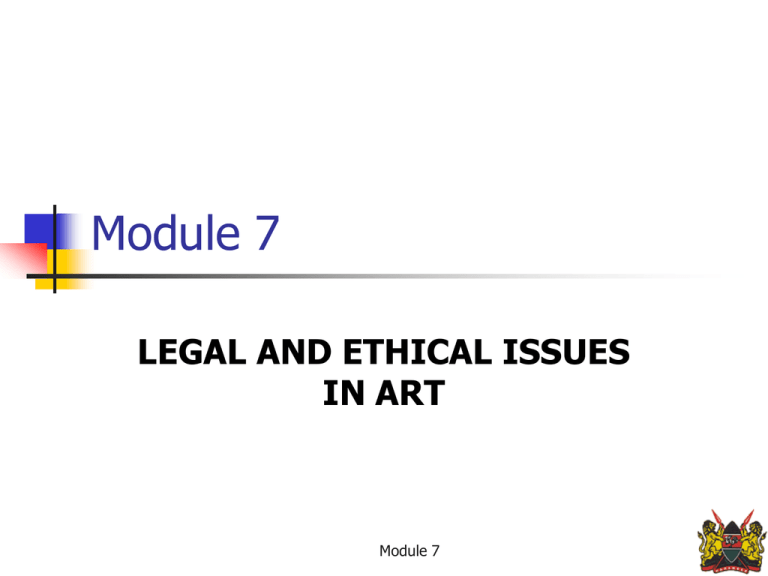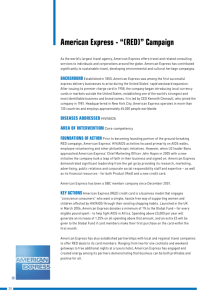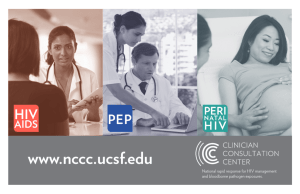
Module 7
LEGAL AND ETHICAL ISSUES
IN ART
Module 7
Objectives
By the end of the session, the participant should:
Demonstrate the linkages between HIV, Human
Rights and Public Health
Describe the ethical and legal issues in HIV/AIDS
generally
Identify the ethical and Legal issues which they may
encounter in ART
Module 7
Objectives (Cont..)
Describe the legal framework in Kenya
that addresses legal and ethical issues
on HIV/AIDS
Describe how to handle the ethical and
legal issues in ART in special
circumstances.
Module 7
Human Rights Principles
Right to non-discrimination, equal protection
and equality before the law
Right to live
Right to the highest attainable standard of
physical and mental health
Right to liberty and security of person
Module 7
Human Rights Principles
(Cont..)
Right to work
Right to marry and to found a family
Right to equal access to education
Right to an adequate standard of living
Right to social security, assistance and
welfare
Module 7
Human Rights Principles
(Cont..)
Right to share in scientific advancement and
its benefits
Right to participate in public and cultural life
Right to be free torture and cruel, inhuman
or degrading treatment or punishment.
Module 7
Human Rights Principles
Rights spelt out clearly in the Universal
Declaration of Human Rights and Kenyan
Constitution
HIV/AIDS initiatives work best where there
is supportive legal and ethical environment
protective to human rights
Module 7
Special features of HIV/AIDS which
raise legal and ethical issues
Feature
Consequences
New Epidemic infection
Fear, misunderstanding and denial
Long asymptomatic period & life Infected often unaware. No action
long infectivity
taken until people become ill
No cure, limited expensive
treatment
Intensifies fear over testing,
burden on family & health services
Module 7
Special features of HIV/AIDS which
raise legal and ethical issues (Cont..)
Feature
Consequences
Associated with stigma and
myths
Patients reluctant to come
forward for testing/care
Affects young adults
Severe secondary costs due to
loss of productive years of life
and burden on family
Module 7
Legal Framework of HIV/AIDS
in Kenya
Amendment of Public Health Act in 1987 –
HIV a ‘notifiable’ disease
Guided by policies and guidelines since then
Sessional Paper No. 4
Guidelines on HBC, ART, VCT, Blood Safety
Other sources include:
The Constitution (Bill of Rights), Common law,
Relevant Statutes eg: Public Health Act
Module 7
Legal Framework of HIV/AIDS
in Kenya (Cont…)
HIV/AIDS declared a national disaster –
Legal Notice number 170 of 26 Nov 1999
Legal Task force on HIV/AIDS established
(2001) – Gazette Notice No. 4015
HIV/AIDS Prevention and Control Bill (2002)
Module 7
Non-discrimination and Equality
before the law
Negative discrimination against persons
infected or affected by HIV/AIDS is not
allowable
Every person infected or affected by the
epidemic remains an equal member of the
society with equal rights
Stigmatization of people with AIDS is equally
unlawful and objectionable
Module 7
Testing for HIV
Mandatory testing for HIV/AIDS should be
prohibited
Prior and informed consent for those being
tested with pre and post-test counselling and
guarantee of confidentiality
Testing without prior and informed consent
may be permissible on grounds of necessity
and only for patient’s health interest
Module 7
Testing for HIV
Negligent testing resulting in misdiagnosis would
invite legal actions for damages against the person
and institution
No blood should be transfused or human organ
transplanted unless known not to be infected
Anonymous and unlinked testing of populations or
groups necessary for epidemiological purposes to
enable surveillance and control
Module 7
Testing for HIV
All pregnant women or girls should be
routinely counselled about benefits of
HIV testing
Ensure informed consent is provided
and counselling offered
Module 7
Ethical and Legal Controversies
Testing for HIV and whether it should be
mandatory or voluntary
Confidentiality of HIV test results with ethical
dilemmas on doctor/ patient relationship,
employer/employee situation, partner
notification
Discrimination of PLWHA in employment and
provision of services
Module 7
Ethical and Legal
Controversies
Criminalisation of deliberate infection
with HIV
Ethics of research
Module 7
Doctor-Patient confidentiality
Confidentiality a must for all health workers
Disclosure only from express consent of patient
Duty of confidence may be waived by public
interest if demonstrated that a greater public good
would be served by disclosure than by maintaining
the confidence
Module 7
Doctor-Patient Confidentiality
Information requested by a patient
about his HIV status should not be
withheld.
PLWHA should be encouraged to share
information of their serostatus with
their sexual partners and those at risk
of infection by them
Module 7
Doctor-Patient Confidentiality
If a doctor or other medical attendant
reasonably believes that a person living with
HIV/AIDS has failed to inform his/her
partner of his/her status and continues to
expose the partner to risk of infection and
a reasonable period has elapsed since the
date when the PLWA was requested to
share the information, the doctor or
medical attendant may be required to
disclose the information to the sexual
partner.
Module 7
Doctor-Patient Confidentiality
For minors and some patients in an
advanced state of AIDS, the doctor or
medical attendant may be allowed to
inform the closest or most appropriate
family member
Module 7
Legal and Ethical Aspects of
ART
Broad Ethical issues that arise in ART are:
Availability
Affordability
Accessibility
Intense debate on best way to deal with scarcity
Principle of justice – effective socially available medical
treatment should not be denied because of inability to pay
Greatest good to the greatest number: interventions that
save lives or reduce suffering to the majority have stronger
ethical claim than those that benefit few individuals
Module 7
Legal and Ethical Aspects of ART
ART in special circumstances
Occupational Exposure
Sexual Assault
Expectant mothers
Unborn babies
Legal and Ethical questions arising include:
Do they need post-exposure prophylaxis
How does one deal with issues of consent and
confidentiality of HIV results
Do they need to know the HIV status of the
patients and vice versa
Module 7
Rights of the Child in the
context of HIV/AIDS
All children under 18, infected or affected by
HIV/AIDS are recognised by the UN convention on
the rights of a child
UN convention states that Children have a right to
life, survival and their development should be
guaranteed
They should have access to HIV/AIDS prevention,
education, information and to the means of
prevention
Rights to confidentiality and privacy in regard to their
HIV status
Module 7
Health Care Workers need not know the HIV
status of the patients and must at all times
adopt the safety measures provided by the
universal standards.
Equally there is no legal justification for the
patient to know the HIV status of the
Health Care Provider
Module 7
Case Study 1
Juma lost his job as a truck driver because he could not keep
awake during long journeys. His boss had noted that he had lost
weight and said that he coughed a lot. The boss requested that
he visits a company doctor who tested him without his
knowledge and passed on the results to the boss
Does Juma have any human rights and if so, which ones?
Was the doctor assisting Juma in doing the HIV test without
his knowledge?
In which ways would the boss and the doctor have assisted
Juma
Module 7
Case Study 2
A 32 year old female school teacher comes to the clinic after
she tested HIV positive at a local VCT. She feels fine and has no
signs and symptoms of AIDS or any other illness. She is married
to a nurse HIV positive too but is in good health. The couple
desires to have children
What do the Human Rights Principles relevant to HIV/AIDS
state?
Should the couple go ahead and get a baby?
As a health worker, what would be the legal and ethical
issues involved?
Module 7







